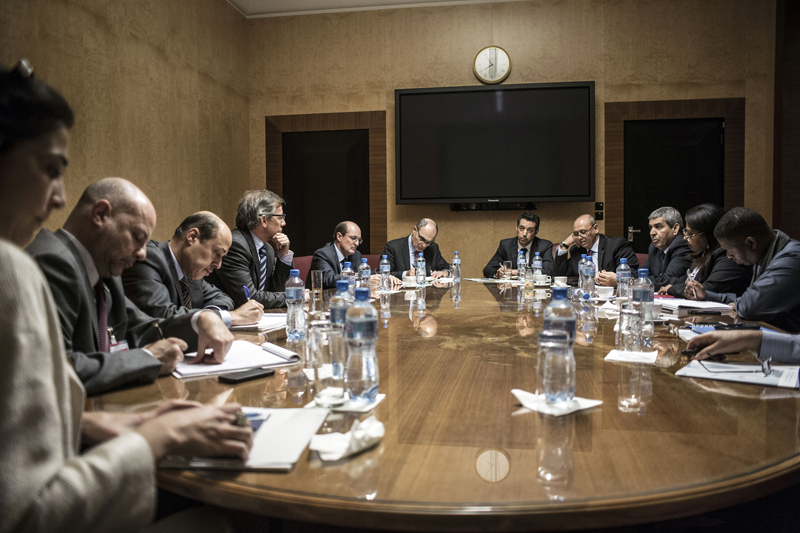By Michel Cousins.

Geneva, 15 January 2015:
After 12 hours at the negotiating table today, delegates to the UN-mediated Geneva talks aimed at . . .[restrict]ending the current political and security crisis in Libya agreed on a series of confidence-building measures which they believe will establish a roadmap to peace in the country. It is hoped it will take the process forward next week towards nominating a government of national unity and ensuring a ceasefire together with the withdrawal of armed groups from the country’s towns and cities.
The confidence measures include:-
- Ensuring the release of those detained illegally;
- Ensuring the immediate release of those abducted and the provision of full information on the missing to their families?;
- Addressing the situation of the refugees inside and outside the country, and the internally displaced, in particular those affected by the latest clashes;
- Enabling humanitarian aid to reach affected areas in coordination with international organisations and civil society institutions, including medical, educational, life-sustaining and public services, with special attention to the most affected regions and areas?.;
- Ensuring an end to media campaigns that provoke division. Political, religious and media messages should be directed to promote reconciliation, tolerance and national unity?.;
- The reopening of airports and ports in the country, of airspace especially with neighbouring countries, the facilitating of aviation and shipping routes as well as land transportation throughout the country and an end to assaults on vital installations ? (such as oil, gas and electrical facilities);
- Ensuring the freedom of movement for Libyans throughout the county;?.
- The payment of salaries to all those who have a right to them without discrimination on any basis ?; and
- Appropriate mechanisms to ensure the import the necessary foodstuffs and supplies?.
In addition, the delegates rejected violence and terrorism in Libya and said that in rebuilding the country there had to be respect for the legitimacy of state institutions, a separation of powers and the peaceful transfer of power. There also had to be a commitment to the principles of the 17 February Revolution.
The delegates were visibly tired by the long process but all those spoken to expressed satisfaction at the outcome so far.
“We realised the weight of responsibility on us in this moment in Libya’s history to find solutions,” former Deputy Prime Minister and currently House of Representatives member Mustafa Abushagour told the Libya Herald. The path to such solutions had been laid, he believed.
Another delegate, Fathi Bashagha from Misrata who has led those boycotting the HoR sessions in Tobruk, said he too was much encouraged by today’s decisions. “We are succeeding [in finding a solution] – and we will succeed,” he predicted.
A number of western ambassadors attended the talks as observers, including those from France, Italy, the UK and the USA. There had been an extremely constructive atmosphere, not only on the plane bringing them to Geneva but at today’s discussions, they said. There was still a lot to do, stressed one, adding though that he was “reasonably confident” that the process would succeed.
Two of them, entirely separately, spoke this evening of a train having started its journey. Others would climb aboard, but they would not stop it reaching its destination.
They also suggested that being in Geneva, away from the crisis at home, had allowed the delegates to assess the situation calmly. “They’re free to make decisions here. There is no one to pressurise them.”
Several delegates plan to fly to Tunis tomorrow on the plane provided by the Italian government that brought them and supporting officials to Geneva yesterday. They will then head to Libya for brief consultations with colleagues before returning to Geneva next week for the next round of discussions. These will include not only municipal representatives but also, it is hoped, members of the continuing General National Congress who did not turn up yesterday.
Congress is expected to vote on Sunday on whether to take part in the Geneva negotiations.
They would do so, said a confident Bashagha. [/restrict]









